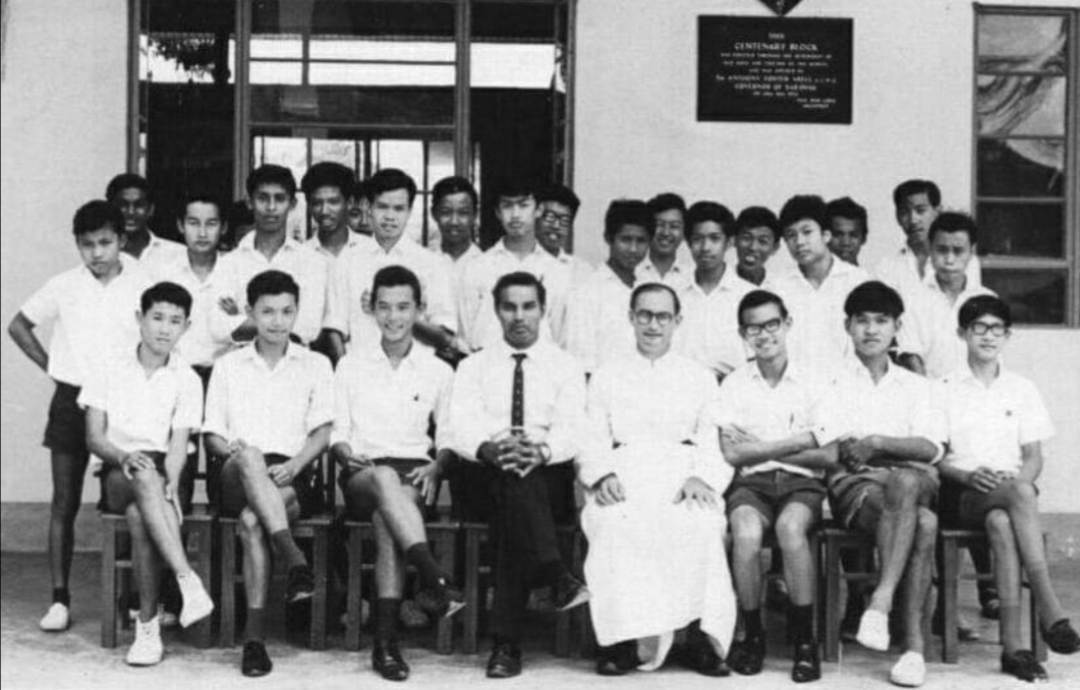
Edgar Ong
MOST folks have mixed memories of their years in school, from the time that they had stepped into Primary 1 (for those born after 1970, it’d either be a playschool or kindergarten) but during my time, it was formal schooling from Day 1.
In the 1950s and 1960s, there weren’t any playschool nor kindy, which were only to come later in the 1970s.
During my time, our education had started at around seven years old, which was the norm in the 1950s. Children nowadays begin kindergarten and playschool at age three or four, which means a more regimented lifestyle with lesser opportunities for them for leisure time to just roam around and make discoveries on their own.
My first day at school was in January 1956 at St Thomas’ Primary School at MacDougall Road in Kuching, my first classroom was a ramshackle wooden structure built on stilts with ‘belian’-tiled roofing and my first class teacher was the late Mrs (later Datin) Betty Brandah. There were 52 of us of mixed races – Chinese, Malays, Iban, Bidayuh, Indianss, and even a Hong Kong boy and a lad from Shanghai.

Year 1967 – Form 5 students of St Thomas’ Secondary School with the principal and teacher Jamal Mohideen.
Our medium of education was English and we had both male and female teachers, also of mixed races. Every morning, we would all line up and march to our grass patch open-air ‘assembly hall’ just a 100 yards away where the Headmaster, Chong En Nyuk, would preside over the proceedings – starting with a prayer, a hymn and some notices.
We were all in uniforms of royal blue shorts and white collared sleeved shirts. There were a handful of boarding house pupils too from the school’s boarding house, which was tucked away between the main building and the Anglican Church cemetery grounds adjacent to the Sarawak Museum.
A year later, in 1957, we had relocated to a new building that stands to this day, although it had since been renovated and expanded numerous times over the years.
In all my 13 years in primary and secondary schools, the daily routine had never changed. We were rather unique in that there were only a dozen or so of what was termed and known as ‘missionary or aided schools’ – which, in effect, meant that our school’s administration was directly managed by an appointed school Board of Governors (later the name changed to Board of Management) and was under the purview of the Ministry of Education.
The term ‘aided’ meant that the funds to run and operate the school had come from the government but, otherwise, we were left rather independent to be managed by the Board and directly the Anglican Diocese of Kuching, which owns the buildings and land and is also the spiritual beacon of the school.
My teachers were all very dedicated, uniformly well-educated and had instilled upon all of us a high sense of discipline and had taught us besides the curriculum and the lessons of the day, on how we should live our lives as good students, and had spared no one either the rod or the tongue-lashing.
Some had their eccentricities, others were more adept at what I’d term now as the early days of psyching and playing mind games with us students (in a good way!).
But each and every one of us knew that deep down inside every single one of them, they had all meant only the best for us – we were their raw virgin clay to be moulded at this very early stage of our lives and our time given to them were very limited as other forces were at play to snatch our brief time and attentions from them.
St Thomas’ School had also taught leadership and strength of character to all its students from a very early age. As students we were selected as class monitors and school prefects to hold office and to be ‘first among students’ in helping our teaching staff to maintain order, decorum and enforce school rules and discipline.
Many of us who were selected then had gone on later in our lives to become distinguished and respected individuals in our various fields; quite a number had joined politics and became leaders of the country and nation, yet others heads of departments and many were bestowed titles and honours. Some became successful entrepreneurs and businessmen; some have since migrated, while others live decent simple lives of self-contentment happily ensconced in the bosom of their loving families.
I remember that from around Primary 4 or 5 when I was around 10 years old, we were encouraged to participate in extracurricular activities that were organised within the school. There were numerous such societies, clubs and uniformed organisations like the Boys Scouts, Debating Society, School Magazine, Chess, Library, Hockey Club, Football, Rugby and the like. This selection process would lead to what I’d term as telling ‘the nerds and the jocks apart’ and would determine later on in life what a student’s main interest and activities in life would eventually be!

Year 1968 – the jocks and nerds at the Ritchies’ Sematan Bungalow.
I had chosen the nerdier life. I was more interested in the non-sporting life away from the jocks and the muddied football and hockey fields; my interests were more inclined towards reading, writing and organising. Thus, I began my lifelong writing career, firstly as a contributor, later editor of the school monthly magazine, then the annual Thomian magazine. I also became a Boy Scout for a short period (lost interest when I had to collect all those badges for odd hobbies, etc); I took part in the Debating Society; and even became the sports captain of my sporting house ‘Mounsey’ simply for my organising skills (not in the track or field!)
However, as is usually the case, most of my best friends during school days were jocks – those actively participating in sports like football, rugby, hockey, track events and others. We used to hang out at the regular favourite 1960s’ spots like the Open Air market downtown, St Michael’s Canteen, the Museum grounds (the ‘angtao peng’ pagoda) and so many others. We’d go for bicycle trips upcountry during weekends, picnics during school holidays and outings to more obscure interesting places.
All too soon we had all reached 18 or 19 and time was up for us at St Thomas’ – indeed a few of us had left a couple of years before the Cambridge A Levels during our final year; some to join the Police Force, others to study overseas and yet others for personal reasons of their own.
We were the lucky ones; we have over the years – it’s 52 years this year – been able to stay in touch, mainly by the marvels of the internet, on emails, on social media like Facebook and by messaging on WhatsApp; and although we’ve only come together in reunion formally three times in the past 10 years or so, we’d continue to meet up in smaller groups as and when the opportunity arises, as our own numbers too had begun to dwindle as we continue to hesitantly check the end pages of obituaries in newspapers near and far.
I would like to conclude with this quote from the good book the Bible, from Ecclesiastes 11: 9-10: “Young people, enjoy your youth. Be happy while you are still young. Do what you want to do, and follow your heart’s desire. But remember that God is going to judge you for whatever you do. Don’t let anything worry you or cause you pain. You aren’t going to be young very long.”
Amen.
